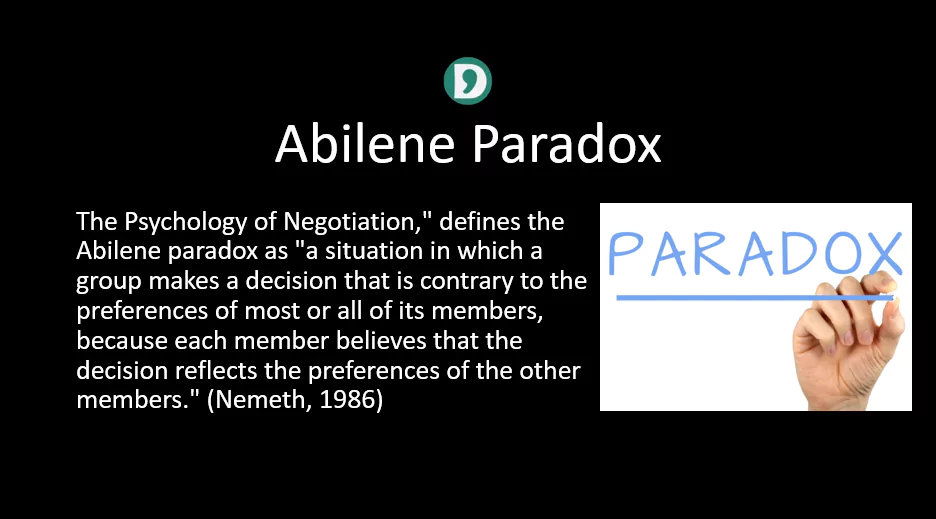Abilene paradox refers to a situation where a group of people comes up with a decision that is against what most if not all members in a group prefer.
It results from group communication breakdown, wherein every single participant mistakenly assumes that his/her preferences stand in contradiction with those of the group as a whole, hence fails to voice any objections or even expresses approval for an undesired outcome.
Definition of Abilene paradox

Jerry Harvey, the coiner of the term “Abilene paradox,” defines it as “a paradoxical situation in which a group of people agree to an action that nobody wants.”
Baron and Janis, in their book “Groupthink: The Psychology of Political Decision-Making,” define the Abilene paradox as “a phenomenon in which a group of people collectively decide on a course of action that is contrary to the preferences of most or all individual members of the group.”
Nemeth, in his book “Bargaining: The Psychology of Negotiation,” defines the Abilene paradox as “a situation in which a group makes a decision that is contrary to the preferences of most or all of its members, because each member believes that the decision reflects the preferences of the other members.”
This paradox arises when one cannot think of other people’s perspectives and agree with them as a group. Jerry B. Harvey is a management expert and coined the term in 1974.
The Abilene Paradox is a phenomenon which is mainly utilized in the area of management and organizational behaviour. This concept is commonly applied to account for poor group decision making and phenomenon where an individual can conform to a group decision while privately disagreeing.
The paradox emphasizes the essence of good communication, open and clear expression of personal position, and the willingness to assert one’s own needs and ideas within a group. The Abilene paradox does not have any specific types, since it’s a general term for diverse situations. Nonetheless, it is commonly associated with organizational decision making which may result in suboptimal endings.
In addition, it is manifested in other settings like family dynamics, politics, and socio-cultural practices. The Abilene paradox is applicable in terms of its application to help examine and enhance the group decision process.
Understanding paradox will help the people and organizations create a conducive environment for the expression of people’s honest opinions and concerns resulting in better decisions.
It is important to note that the Abilene Paradox is just one of many concepts and theories related to group dynamics and decision-making. Other related concepts include groupthink, social conformity, and the wisdom of crowds. Each of these concepts offers different insights into how groups make decisions and the potential pitfalls that can arise.
Was this helpful?
0 / 0